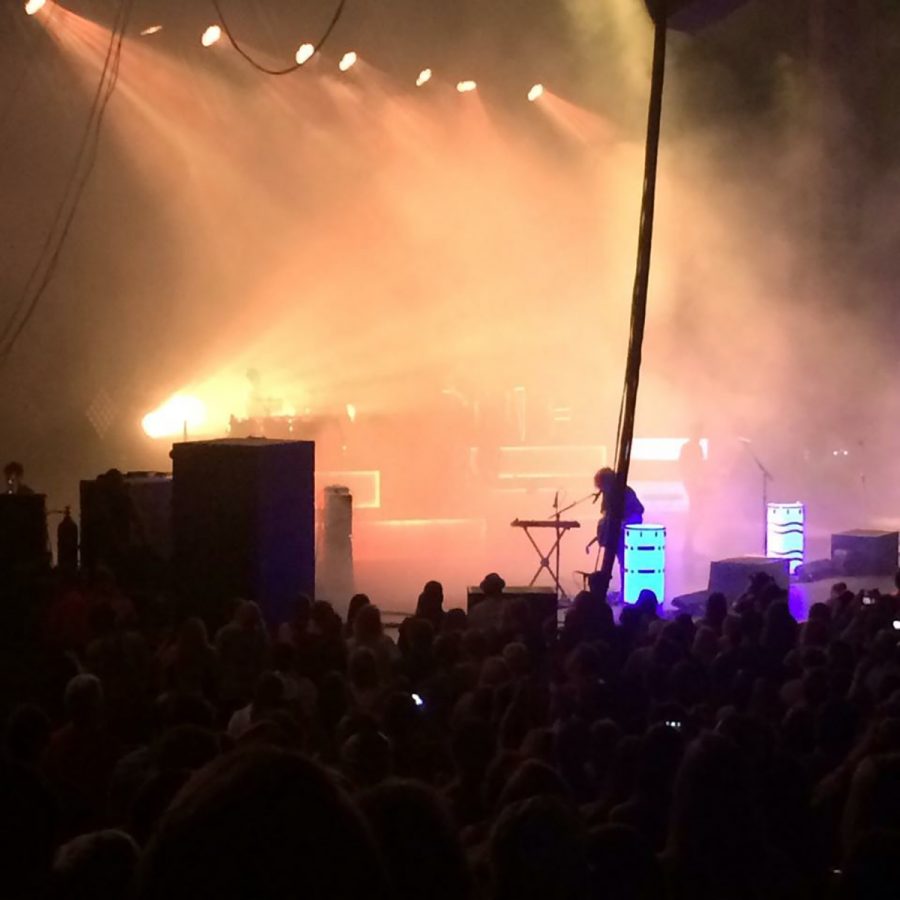Live music as a stress-reducer, emotional outlet
Concerts proven to have a positive bodily effect as well as being a moving experience
More stories from Nicole Bellford
Photo by Nicole Bellford
Live music is played for an appreciative audience this past summer at Milwaukee’s Annual Summerfest Music Festival.
The auditorium fills as music listeners and lovers alike take their places in the audience. Ticket stubs are smushed haphazardly into wallets, jean pockets and purses. No one can look away from the stage.
In an instant, the spotlights awaken and illuminate a set of curtains, now the only layer between the crowd and the anticipated performers. Within that moment, the audience rests on the edge of their seats, palms sweating and stomachs flipping in anxious anticipation; the only tangible sound residing within the air is a pure and potent silence.
A steady roar erupts from the crowd and the performers make their grand debut as the curtains are swept aside. The opening song cascades across the air, sending sounds of familiarity through audience’s eardrums and encouraging them to sing along.
In that passing hour, as the performers continue playing their set list, the audience will experience nearly every emotion in the book. From outlandish joy upon watching their favorite performers’ personalities unfold before their eyes, to pure electricity as they blissfully hear their all-time favorite song performed live for the first time, some may claim there is no simple way to describe live music.
But perhaps not.
A study conducted by the Public Health Journal suggests that attending live music events is beneficial in more areas than simple preference. The study claims that live music increases endocrine activity, meaning more cortisol hormones and reduces stress.
Truthfully, anyone who has attended a concert would find it difficult not to feel at peace (and significantly less stressed, for that matter) as they let themselves tune in to the music around them, swaying along with catchy tunes and snapping their fingers or tapping their feet to the beat of the drums.
A Public Health Journal study projects that the physical activity endured at live music events (ie: revealing those radical dance moves) can allow one to burn anywhere between 300-400 calories.
Programs such as UCLA’s “Mindful Music” initiative prove the aforementioned study is far from a one hit wonder.
The UCLA Newsroom reports that professors and students teamed up in January of 2015 to hold weekly 30 minute concerts across campus in an effort to reduce student stress and anxiety levels. Professors and students alike reported feeling “emotionally healed” by the concert series and received high praise from the Center for Health Sciences, being seen as a “real mood changer.”
As an avid concert enthusiast myself (129 concerts and thousands of dollars later), I can personally attest to these scientific statements. From summer spotlight evenings spent swaying along to country jams in the grass, to winter roadtrips across the midwest made in the effort to enjoy a night of musical bliss in the Chicago House of Blues, one could say I’ve traveled near and far for the ultimate live music experience.
Believe it or not, I can attest that the ticket costs, endless driving routes and even waiting in long lines to be permitted to enter the pit is absolutely worth every second.
I have always believed music to be an unbelievably loud, powerful voice in the waves of culture and the media. Music works in beautiful ways to heal those who are willing to listen. From helping someone through a mentally trying experience, to making controversial statements on national issues and great debates, music speaks when others are silent. Live performances quite literally bring these kinds of ideals to life, lighting them on fire for all to see.
When we let our minds fall into the rhythmic melodies and sway along to the beats that consume our tapping toes and clapping hands, we let ourselves be free. All that matters in that distinct moment is the music.
Clearly, live music heals in more ways than we even thought possible. In the future, whether it be Justin Bieber or The 1975, perhaps we can all agree that a setlist a day will keep the doctor away.


Eli Richardson • Sep 28, 2022 at 3:53 pm
My sister and I are interested in going to a concert next month, but we’ll need to drive long hours to get to it, so we’re not sure about it. We’re happy to read your article about how live music could actually reduce our stress by creating our endocrine activity, so I’ll share this with my sister to help make up her mind. Thanks for explaining why everyone should attend a live music show in their lives. https://playhouse.pointpark.edu/